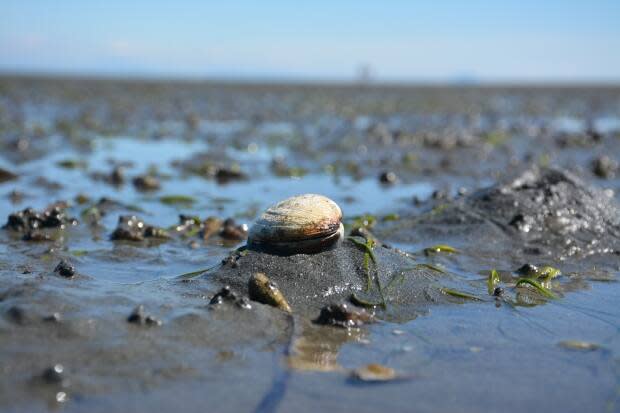Increase in illegal clam digging in B.C. could raise risk of deadly poisonings, fisheries officials warn

Flora Qu admits digging for clams is hard on her back but says it seemed like a good way to get out of the house given the pandemic restrictions.
"First time [I've] come here," she said recently as she and a friend spent a couple of hours digging at Centennial Beach in Delta, B.C., just south of Vancouver. "Just want to exercise and have fun."
Qu said she didn't know harvesting shellfish like clams and mussels — called bivalve shellfish — is illegal in B.C.'s Lower Mainland.
Fisheries and Oceans Canada (DFO) has banned bivalve shellfish harvesting across the bays and inlets of Metro Vancouver and up the Fraser River because of pollution and naturally occurring toxins for about 50 years.
Bivalve shellfish are filter feeders, which means any contaminants in the water can build up inside them and make them potentially deadly to humans who eat them, experts say.
Fisheries officials told CBC News there has been a dramatic increase in people digging for clams during the pandemic, a trend that has raised concerns about the toxic potential of harvested shellfish from the region.

"It's about three times the number of encounters," said Art Demsky, a DFO detachment commander. "The worst fear is that someone gets sick and possibly dies."
He said people can become sick even after handling the shellfish.
"Especially kids," he said. "They like to play with things, maybe collect shellfish and then, of course, their fingers go in their mouths. So, it's a worry."
If consumed, naturally occurring toxins produced by phytoplankton in the water can lead to diarrhetic, amnesic and paralytic forms of shellfish poisoning. Paralytic shellfish poisoning is potentially fatal.
Demsky said stopping illegal harvesting is a priority, but DFO's efforts are limited by the vast area of the region.

'They just ignore us'
Richard Wong regularly comes to Centennial Beach to go crabbing — which is legal when in season and with a licence — and has seen an uptick in the number of people digging for clams.
"I try to tell them … 'You shouldn't be picking up those things,'" Wong said. "But then when we walk away and turn around, they start picking again."

Tira Chow started crabbing last year and said she has been surprised by how many people she sees gathering buckets of clams.
"I mentioned it to a couple of people, but they just ignore you," she said. "So, I just think there should be more signs posted."
Chow and Wong both feel the English-only signs posted are not enough and need to be in multiple languages.
But Demsky said that's difficult given the diversity of ethnic backgrounds of the people harvesting shellfish. He said DFO has pamphlets in various languages and has put information out on social media and in newspapers in different languages.

New closures map released
The B.C. Centre for Disease Control (BCCDC), which tracks cases of illnesses, is also trying to make it easier for people to familiarize themselves with the rules.
It is launching an updated website this week showing all the locations of closures and a guide telling people exactly what the different shellfish look like.
"A lot of times, the poisonings we get, people said, 'Oh, I harvested some clams.' And when we ask them, 'What type of clams did you harvest?' they don't know," said Lorraine McIntyre, a BCCDC food safety specialist.
She said three people reported becoming ill from shellfish in April compared to one in 2020 and one the year before, but she said many people don't report illnesses and some cases can only be confirmed by testing the contaminated shellfish — not the person.
Toxins are resistant to cooking
As for the idea you can cook your way to a safe clam, that is simply not the case, McIntyre said.
"While cooking will prevent you from getting bacterial illnesses, it's not going to do anything with the toxins," she said. "They are resistant to cooking. And, in fact, sometimes the toxins get more potent after cooking."

McIntyre said it is crucial for anyone who feels unwell after eating shellfish to contact their doctor or poison control immediately.
And while illness should be a deterrent, Demsky said, so, too, should fines. People caught illegally harvesting shellfish risk tickets starting at $250, with additional fines for each shellfish up to $100,000.

